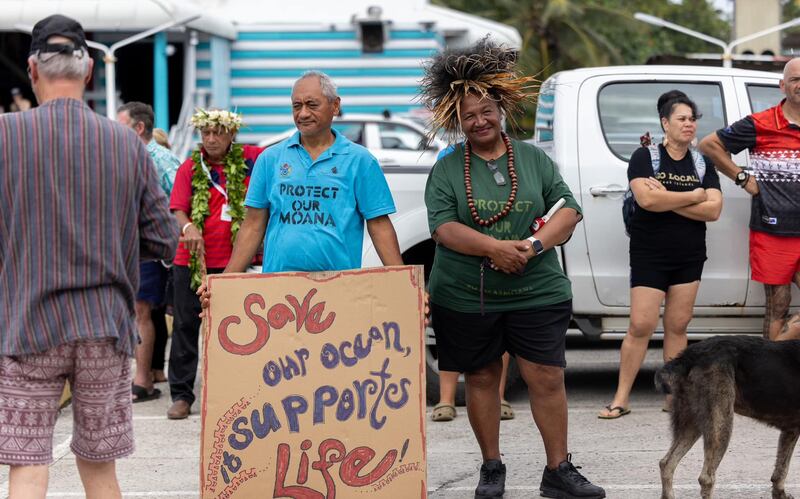Dozens of underwater minerals experts descended on the remote Cook Islands in the South Pacific this week for a conference that was the latest sign of the country’s embrace of a contentious industry: deepsea mining.
Yet despite goldrush-like promises of a financial windfall, not everyone in this nation of pristine white sand beaches and 15,000 people is convinced its seabed should be exploited for minerals such as manganese and cobalt.
“Protect Our Ocean, #Think Deeply,” declared a 75-square meter sign floated in Avarua Harbour Wednesday by a flotilla of several hundred Cook Islanders who took to the water in a traditional double-hulled vaka, kayaks, jet skis and other vessels.
Potato-sized polymetallic nodules that carpet swathes of the seabed are touted as a potential source of metals needed for green technologies, such as electric vehicle batteries, as the world tries to reduce reliance on fossil fuels.
Skeptics say such minerals are already plentiful on land and warn that mining the seabed could cause irreparable damage to an environment that is still poorly understood.
The seafloor around the Cook Islands is particularly rich in nodules and a 2019 study estimated they could add billions of dollars to its small economy if hoovered up for processing on land.
Alanna Smith, a protest organizer, said the three civil society organizations behind the demonstration wanted to counter a perception that Cook Islanders are unanimously in favor of mining the deep sea.
“Internationally, we wanted to show there is opposition to deepsea mining by local communities here in the Cook Islands,” Smith told Radio Free Asia.
“I think there’s been messages shown that our government has the social license of our people to look further into this industry, but it isn’t the case at all,” she said.

Significantly more time is needed for independent research to be conducted on the deep sea ecosystem and to foster greater discussion and understanding in the Cook Islands of the potential risks and threats, Smith said. Research published in the journal Nature in July indicated that the nodules produce oxygen.
The country in 2022 issued five-year exploration licenses to three seabed mining companies, although its government hasn’t announced if or when mining could start.
While the Cook Islands is focused on nodules within its vast exclusive economic zone, some Pacific island neighbors such as Nauru are hoping to exploit resources in international waters that are administered by the U.N. affiliated International Seabed Authority, or ISA.
In conjunction with Nasdaq-listed The Metals Company, Nauru’s government has been pressing the ISA to approve mining before its 169 member nations agree on regulations for the industry.
Nauru's president David Adeang told an ISA meeting in July that deepsea mining was crucial to the survival of his 21 square kilometer (8.1 square mile) island nation and its 10,000 people.
Staying poor?
Similar sentiments are also expressed by leaders in the Cook Islands.
“Do you want to have a wealthy country or do you want us to remain poor for the rest of our lives,” the clerk of the Cook Islands parliament, Tangata Vainerere, said in a Facebook Live interview before the Avarua demonstration.
“I am the head of parliament and I struggle every year to get funding to pay for all the things that I and my people need,” he said.
“Now every other ministry is facing the same problem. So how are we going to solve that problem? We can’t under the current economic strategy.”
The Cook Islands’ tourism-reliant economy suffered a blow from the COVID-19 pandemic, but income per head remains multiple times higher than most other Pacific island countries, according to the 2021 census, and around the World Bank’s threshold for high-income status.
The week-long underwater minerals conference in Rarotonga – where nearly three quarters of Cook Islanders live – has billed itself as “the world’s largest gathering of ocean mineral stakeholders.”
Its sponsors included the Cook Islands Seabed Minerals Authority, or SMA, – set up to regulate mining – and companies with licenses to explore its seabed such as Moana Minerals and CIC Ocean Research.
Civil society organizations, in a letter to the Cook Islands News this week, expressed concerns about how deepsea mining companies have "embedded themselves into the many layers of our society."
Well publicized examples include funding a charitable trust and sponsoring the country’s main cultural festival and its international cricket team.
Deepsea mining industry representatives also took part in a government delegation to schools last year to raise awareness about seabed minerals, according to a SMA statement.
Juressa Lee, a Greenpeace campaigner, said the activities are a “greenwashing” effort.
Edited by Taejun Kang and Mike Firn.
